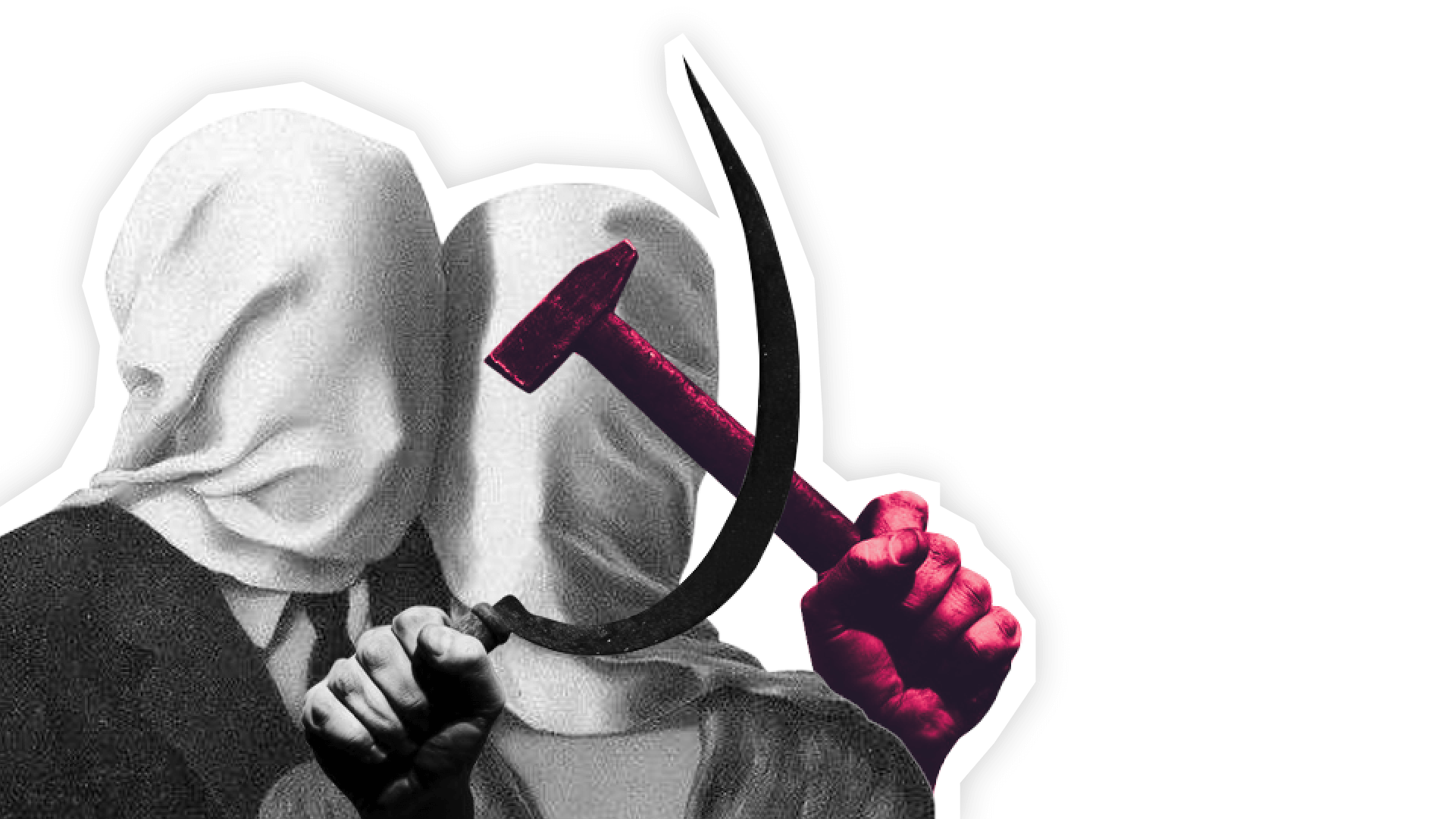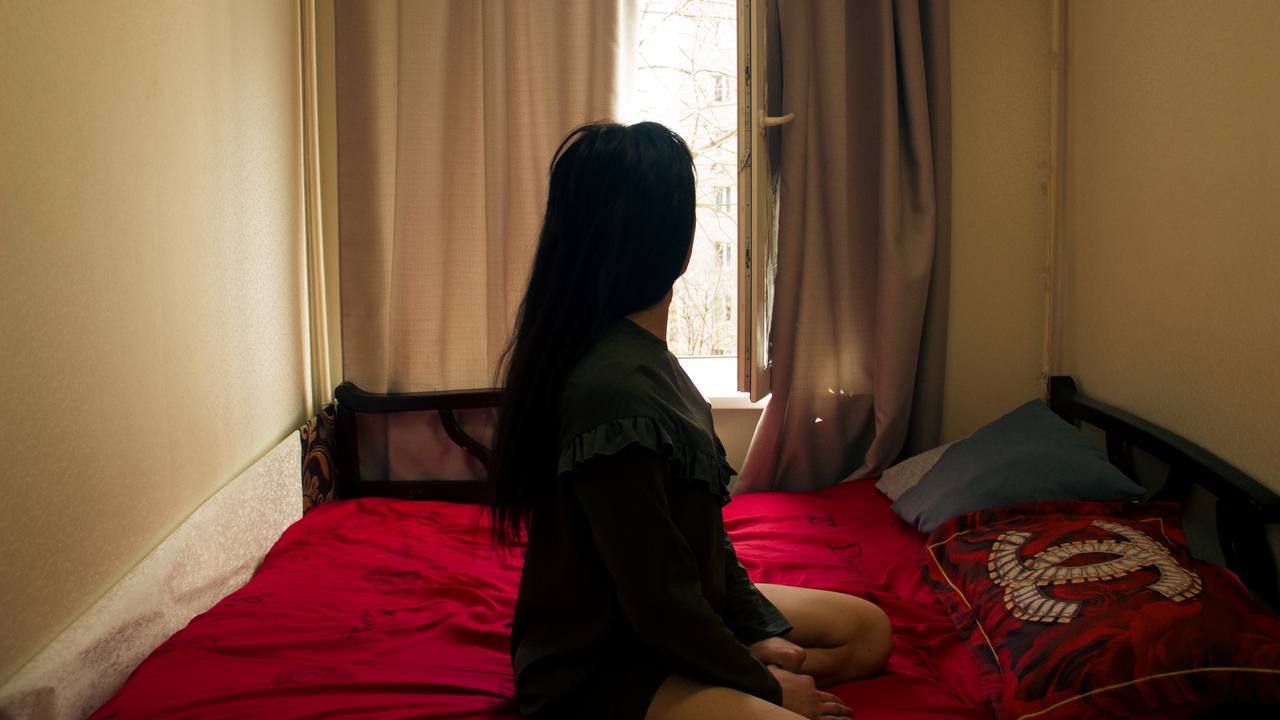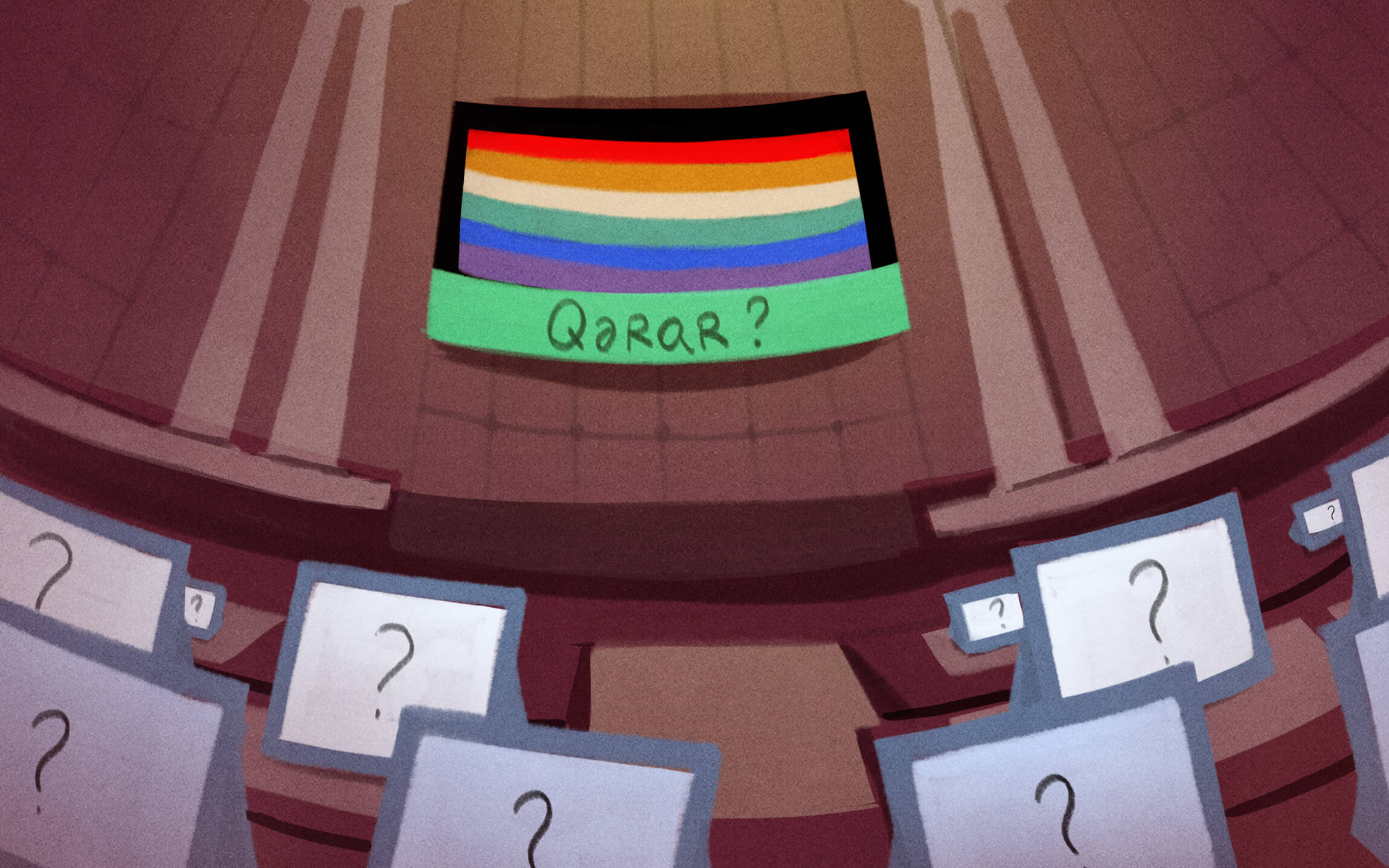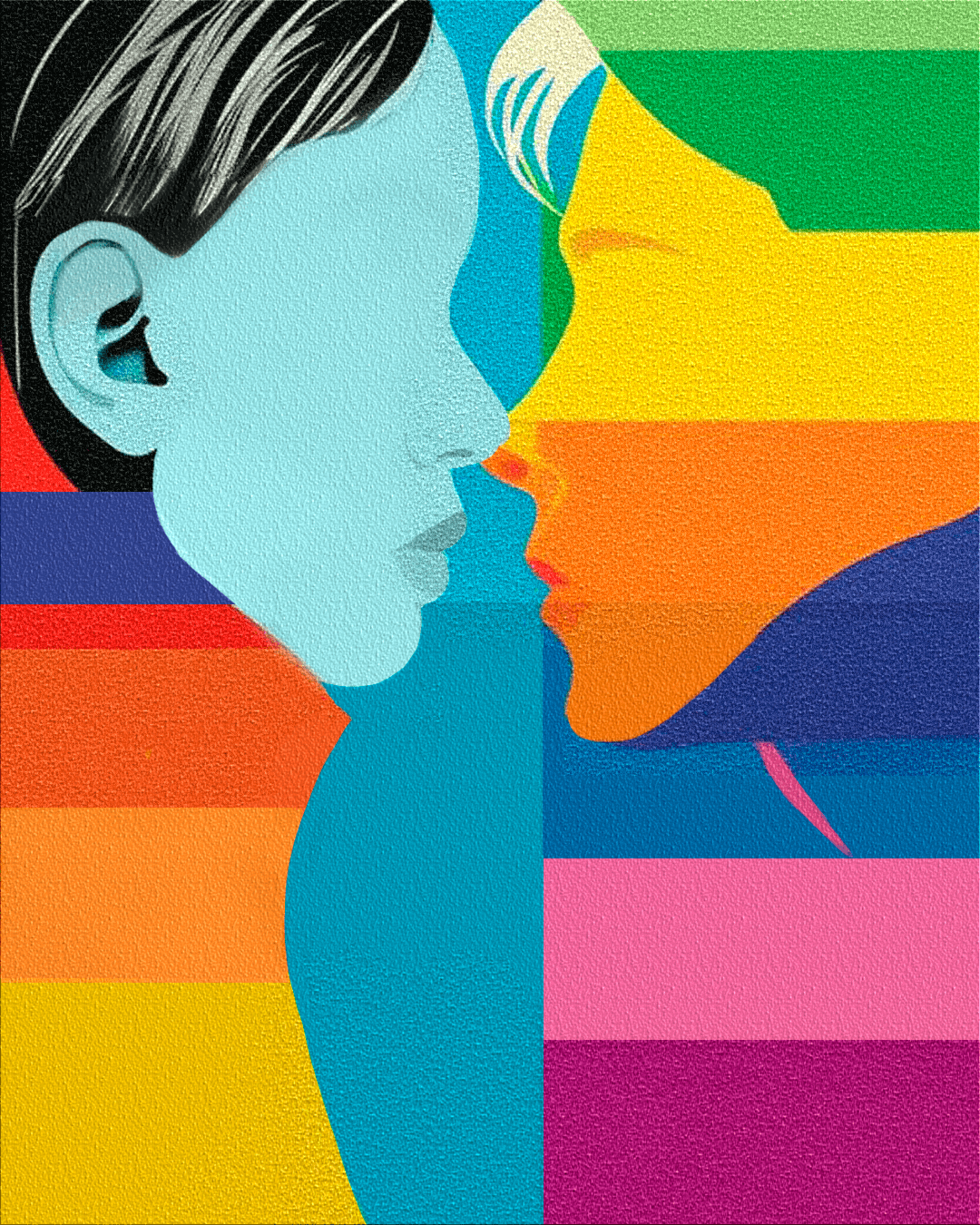Non-traditional Values: Did Uzbekistan Inherit Homophobia and Family Concepts from Soviet Union?
Translated by Valeria Khotsina
Uzbekistan works towards adopting an Information Code that would ban “propaganda of unnatural same-sex relations”. International organisations, including the UN and Human Rights Watch, have called for both the abolition of Article 120 of the Penal Code (“sodomy”), which was removed from the codes of three other Central Asian countries 25 years ago, and the scrapping of the draft law, which contains discriminatory articles on the right to disseminate information.
[playht_player width=”100%” height=”90px” voice=”en-US-ElizabethNeural”]
What are the roots of homophobia in Uzbekistan?
Despite the common rhetoric that “non-traditional relations” have always been condemned in Central Asia, research shows that the greatest persecution of LGBTIQ+ people occurred in Soviet times, when the crime of “sodomy” was introduced and then implemented into local law. Since then, laws in post-Soviet countries have changed, but in Uzbekistan, the criminal legislation regulating same-sex relationships has remained Soviet and, in the last year, has copied the Russian acts.
Below we explain how LGBTIQ+ rights legislation has changed over the last century, and how Uzbekistan inherited homophobia and privacy invasion policies at the legislative level from the Soviet Union.
Attitudes to LGBTIQ+ people in Central Asia before colonisation by the Russian Empire
Writing for Masa Media, social anthropologist Zarina Mukanova argues that homophobia in Central Asia did not emerge during the Soviet era, but much earlier, with the onset of Russian colonisation and the research of ethnographers, military personnel and travellers. Their observations created an image of “the Orient” in the Russian Empire.
“The notes of travellers and ethnographers are full of condemnation of the Bacha culture – boys from poor families who were trained as dancers to please adult men. Such practices were of interest to travellers, described vividly and in detail, but seen as immoral and criminal. Of course, nothing can justify the sexual corruption of young boys for the pleasure of rich men”.

The practice of Bacha Bazi is an example of sexual slavery rather than voluntary gay relations, as Bacha Bazi involves a forced relationship between an adult and a minor of a lower social status. However, according to the researcher, such practices indicate the normalisation of gay life in Central Asian urban culture.
In the 18th century, Peter the Great introduced a series of reforms aimed at modernising and westernising Russia and banned homosexuality, but only in military regulations for soldiers. In 1832 Article 995, which made “sodomy” a crime punishable by exile to Siberia for up to five years, was added to the penal code. These were rarely enforced, however, and by the turn of the century these laws had begun to be loosened and tolerance generally increased.
After the October Revolution, the new regime decriminalised homosexuality. The Bolsheviks tore up the constitution and issued two penal codes – in 1922 and 1926 – neither of which outlawed gay sex.
For a long time, the Bolsheviks demonstrated a rather loose view of sexual matters. In Soviet Russia in the 1920s, “alternative” sexual orientation was neither criminalised nor considered a mental disorder. At the 1928 Sexual Reform Congress in Copenhagen, the Soviet Union was proclaimed a model of sexual tolerance. At the same time, the penal codes of some of the Caucasian and Central Asian republics of the USSR continued to treat “sodomy” as a crime throughout most of the twenties.
Historian Timofey Rakov believes that homosexuality was associated with the crisis and disintegration of bourgeois personhood. The threat of war, including the rise of the Nazis in Germany, was the other side of the coin, according to the historian. The impending war has fuelled anxiety related to the human resources that the battling states would have at their disposal. The authorities, therefore, paid special attention to the family as a source of “human material” production. Male gay couples were unable to produce children, which meant that they indirectly affected the country’s defence capability.
State attitude to the family, marriage and LGBTIQ+ in USSR
In the 1920s, the glass of water theory was extremely popular. The press wrote about it and debates were devoted to it. The attitude towards love, marriage and family involved denying love and reducing the relationship between a man and a woman to an instinctive sexual drive that should be satisfied without any “conventions”, as easily as quenching a thirst (having sex is as simple as drinking a glass of water). Lenin, however, took a negative view of this theory.
In 1924, psychiatrist Aron Zalkind published “The Twelve Sexual Commandments of the Revolutionary”. This code, designed to regulate and stem the tide of popular desire for sexual freedom, was advisory and educational (not binding) in nature and was far from being always applied in practice. Commandment No. 7 reads: “Love should be monogamic and monoandric (one woman, one man)”. The general meaning of these sexual commandments was to ensure that the energy of the proletariat, as a whole class, was not wasted on sexual relations useless to its historical mission.
In 1926-1929, the glass of water theory was heavily criticised and faced reprisals. After the 1920s the authorities turned to family values again. Abortion, for example, was banned again in 1936, when an attempt was made to re-establish the family as a strictly moral and well-ordered “social unit”.
The Second World War claimed the lives of tens of millions of Soviet citizens, and it was the demographic crisis that led Soviet leader Joseph Stalin to devise measures to improve the situation. It was a system of rewards and punishments that would encourage people to marry and have more children. Rustam Alexander wrote about it in his book Red Closet: The Hidden History of Gay Oppression in the USSR.
The 1977 Soviet constitution stated that “marriage is based on the free consent of a woman and a man; spouses are fully equal in family relations”.
Under Nikita Khrushchev, the party made sure that marriages did not break up, and “public discussions of family disputes and reprimands for failing to arrange a happy marriage life were not uncommon”.
Homosexuality was officially considered a mental disorder from the late 1920s onwards, and LGBTIQ+ rights issues were severely censored.
On 7 March 1934, Article 121 was added to the criminal codes throughout the USSR, explicitly outlawing gay relations, punishable by up to five years of imprisonment. There were no criminal penalties for lesbians. During the Soviet regime, Western observers estimated that between 800 and 1,000 people were imprisoned under Article 121 each year. This article was often used against political dissidents.
“Article 121 was likely a convenient tool for putting pressure on disloyal intellectuals and other social groups, and in some cases, such charges concealed the true motives of the persecution. One of the most famous victims, for example, was film director Sergei Parajanov, and it can be assumed that he was in fact persecuted for his work”, notes historian Timofey Rakov.
Arranged marriages and living in constant fear
LGBTIQ+ people in the USSR lived in constant fear of getting exposed. Those who wanted a position in the Communist Party were expected to marry someone of the opposite sex, regardless of their actual sexual orientation. A prime example was Russian film director Sergei Eisenstein, who led a double life, having affairs with men, being married to a woman and producing films that were politically desirable to Stalin.

State censorship of gay rights information did not subside until the early 1970s. In 1984 a group of men tried to set up a gay rights organisation, but it was quickly shut down by the KGB. It was only later, during the Glasnost era, that public discussion of legalising private, consensual gay relations was allowed.
A 1989 poll showed that gay people were the most hated group in Russian society and that 30 per cent of those surveyed thought that gays “should be eliminated”.
In 1990, a gay rights organisation led by Evgenia Debryanskaya was allowed to operate in Moscow, and Roman Kalinin was able to publish the gay newspaper Tema.
In 1989, Vladimir Veselkin, a member of the band Auktyon, and singer Garik Sukachov gave concerts against the persecution of gays. Two years later, dozens of rock bands, individual musicians, journalists and cultural figures signed a petition to repeal Article 121. Nevertheless, the article was not removed from the code after the collapse of the USSR. There were 462 convictions under this law in 1991 and 227 in 1992.
A law decriminalising same-sex relations was passed in Russia in May 1993, not as a result of a public debate but as part of the legislative reforms required for accession to the Council of Europe. However, those serving a sentence for “sodomy” at that point were not released and those previously convicted were not rehabilitated, as was the case, for example, with victims of political repression.
The changes after the collapse of the USSR: how Central Asian countries decriminalised “sodomy”
Uzbekistan and Turkmenistan remain the only countries in Central Asia where sex between men is criminalised. Other post-Soviet countries have decriminalised it, the first being Ukraine (1991) and the last being Armenia (2003).
In the neighbouring Central Asian republics of Kazakhstan, Kyrgyzstan and Tajikistan, sex between men was decriminalised as early as 25 years ago, in 1998.
Most post-Soviet countries do not recognise same-sex marriage, LGBTIQ+ people cannot adopt children (except for Estonia, where this is allowed in situations where both partners are infertile) and most countries still have discriminatory laws against LGBTIQ+ people.
The return of Russia to “traditional values”
Since 2006, several laws have been passed in the Russian regions which have restricted the distribution of materials promoting LGBT relationships among minors. In June 2013, a federal law was adopted amending the existing Child Protection Act to criminalise the distribution of materials promoting “non-traditional sexual relations” among minors.
At the time, Vladimir Putin said he had an “absolutely normal” relationship with his gay subordinates, acknowledged the importance of their service to the country, called the problem of persecution of gay activists in Russia exaggerated and promised that the new law would not punish people for using the LGBT rainbow flag. He also noted that “70 countries in the world criminalise homosexualism. In seven countries it is punished by the death penalty”. In 2021, the same rhetoric was used by Alisher Kadyrov, deputy speaker of the Oliy Majlis of Uzbekistan.
2022 was one of the toughest years in Russian history for LGBTIQ+ people. On 24 November, the State Duma adopted in the third reading a package of bills banning “propaganda of non-traditional sexual relations”. On 30 November, the Federation Council passed them, and on 5 December, President Vladimir Putin signed them into law. In an address to the Federal Assembly that followed shortly after that, Putin declared that “no one is going to invade the privacy of Russians, but Russian citizens are obliged to ‘protect children from degradation and degeneration’”.
“Look at what they are doing in the West: paedophilia is becoming the norm, priests are approving same-sex marriages”, he said.
Vladimir Son, the founder of the Invisible Rainbow project on the LGBTIQ+ community in Central Asia and Russia, believes that the demonisation of the community is aimed at blaming all social problems on LGBTIQ+ people and finding an “internal enemy”, be it a migrant or another representative of marginalised groups.
Society continues to live in a homophobic paradigm
While the law decriminalising same-sex relationships was passed in Russia in May 1993, the LGBTIQ+ community did not feel safe. Vladimir moved from Tashkent to Russia in 2011.
“Society was still living in that paradigm until the day I left Russia after the outbreak of the war in Ukraine. I felt all the misfortune of being non-Slavic because in Tashkent I identified more as a human being. My Korean background felt secondary. In Russia, I was seen first and foremost as a Korean. I was no longer ‘equal’ as a human being. I became a second-class individual. It seems to me that nothing has changed in terms of xenophobia and chauvinism, which is why I started the Invisible Rainbow project about queer people with non-Russian backgrounds in Russia and Central Asia”.
Vladimir has faced aggression on more than one occasion, such as on New Year’s Eve 2021 in St Petersburg when he walked through the city holding hands with his boyfriend. “I didn’t feel safe in this society in general. As a queer person, I felt even more scared. I dressed sharp, despite society’s attitude that men shouldn’t look classy – it’s shameful. Style is often equated with being ‘turned out’, according to prison terminology”.
Prison etiquette, which emerged in Russian prisons in the 1930s, introduced the notion of a “turned out”, i.e. a person who is either gay or has been sexually assaulted for violating prisoner ethics. Such prison etiquette is still common in “black” prisons controlled by crime lords, where, unlike in “red” prisons – with stronger prison administration – the rules of conduct are dictated by influential prisoners rather than the administration.
“At the same time, the influential prisoners themselves (such as those convicted of murder or fraud) may rape an inmate convicted under Article 120 because their ‘etiquette’ requires them to ‘downcast’ him. In this way, the perpetrators engage in same-sex intercourse, but that doesn’t make them any less respectable”, says Ruslan [name changed], who was recently released from prison where he was serving a sentence for “sodomy” in Uzbekistan.
In November 2022, President Vladimir Putin approved “The State Policy Framework for Preserving and Strengthening Russia’s Traditional Spiritual and Moral Values”. The “traditional values” include “life, dignity, human rights and freedoms, patriotism, sense of nationhood, service to the Fatherland, responsibility for its destiny, high moral ideals, strong family, creative labour, a priority of the spiritual over the material, humanism, mercy, justice, collectivism, mutual aid and respect, historical memory and continuity between generations, unity of the peoples of Russia”.
“The document explains how countries, corporations and other threats can damage our traditional values. In short, they begin to impose their values on us. Hence comes selfishness, overindulgence, propaganda of unconventional relationships and ‘denial of Russia’s positive contribution to world history’”, Komsomolskaya Pravda wrote, explaining the document’s merits.
Incorporating “traditional values” into legislation in Uzbekistan
The “new” constitution that took effect on 1 May 2023 reads: “Marriage is based on the traditional family values of the people of Uzbekistan and the free consent and equal rights of those entering into marriage”. The previous version of the Constitution did not contain this paragraph in the Family section. One of the drafts (which was ultimately not put to a referendum) proposed that “marriage is based on the free consent and equality of a man and a woman”.
“On the whole, it is a rational solution that does not offer a great deal and does not bind us to anything in particular. And it doesn’t create problems with international organisations and financial institutions”, international relations expert Yuri Sarukhanyan wrote on his Telegram channel, referring to the amendments to the country’s constitution.
The draft Information Code proposes to prohibit “propaganda of unnatural same-sex relationships”. The code, which was supposed to consolidate eight laws on blogging and media, has not yet been adopted. Human Rights Watch believes that the law contains discriminatory provisions against the “promotion” of same-sex relationships which would only exacerbate the stigma and discrimination faced by LGBTIQ+ persons in Uzbekistan. The organisation believes that the draft law should be revised and the discriminatory provisions removed.
“It is a violation of the civil rights of queer people. Basically, it is a violation of freedom of speech as such. Nothing good will come out of the possible adoption of the code. Even if we put aside the civil society aspect, it is harmful to the economic development of the country. Because the freer a country is, the freer it is for investment, the freer it is for its citizens, the safer it is, the better it is for the development of the country itself”, says Vladimir Son of the Invisible Rainbow Project.
Why criminalising same-sex relationships is a human rights violation
Human rights organisations have repeatedly urged Uzbekistan to remove Article 120 (sodomy) from its Penal Code. The UN High Commissioner for Human Rights, Volker Türk, during a visit to Uzbekistan in March this year, once again called for decriminalising consensual same-sex sexual acts.
The existing criminalisation of same-sex relations in Uzbekistan leads to stigmatisation and harassment of LGBTIQ+ people by police officers and encourages violence against LGBTIQ+ people. Other consequences of criminalisation include exacerbating the HIV epidemic by discouraging men from seeking prevention or HIV treatment.
The European Court of Human Rights has found that laws criminalising homosexuality violate the right to privacy guaranteed by Article 8 of the European Convention on Human Rights.
Until 1997, the Australian state of Tasmania had the harshest penalties for gay relationships in the Western world. While Tasmania argued that the law was necessary to protect traditional morality and prevent HIV transmission, the Human Rights Committee concluded that the morality argument was not consistent with international human rights law.
“Russian propaganda claims that promoting LGBT relationships influences a person’s formation and choice of sexuality, but this is not true, because living in a religious Christian family in Tashkent and not having access to the internet, I felt like a queer person without even knowing that such a thing existed. Society told me that the only way to practise my sexuality was to get married, have children, plant a tree and build a house. I didn’t have access to the internet at the time, but even as a child, it didn’t make sense to me. This is when I developed self-loathing. I never saw a rainbow flag. To this day, there are none in Uzbekistan. There were no pride festivals, but nevertheless, I feel the way I feel now”, says Vladimir Son.
Referring to Article 120 of Uzbekistan’s Penal Code, Vladimir believes that as long as there are laws that ostracise people simply for being themselves, society will not become free and democratic, because there will always be people who will be harassed.
“This article violates the rights of someone who feels like a queer person, but has no access to information. I am convinced that many people are afraid for their lives because they feel they are different and end that life before they get to live it. The article needs to be abolished so that people stop being imprisoned for who they are. That would be a big step in itself that could promise a safe future for all. I truly believe that only when this happens and society realises that this is necessary, a complete separation from the Russian Federation and the Soviet Union will happen”.
Read more articles from the Issue
Nothing Found

What if homophobia in Central Asia is a product of colonialism?

Russian Propaganda’s Influence on Soviet and Post-Soviet Homophobic Narratives in South Caucasus

Russian Colonialism and Homophobia in Moldova

Migration Is the Path to Freedom. A Photo Report about Sumaya

Russia’s Homophobic Law Inspires Azerbaijani Political Elites

“I Put a Lid On My Sexual Orientation, I Buried It”: Life of LGBTQ+ People in the Temporarily Occupied Territories of Ukraine

Gay Pride Parade, “Dazhynki” or White March: which holiday suits “Belarusians of the future”?

Beyond Blurred Existence
